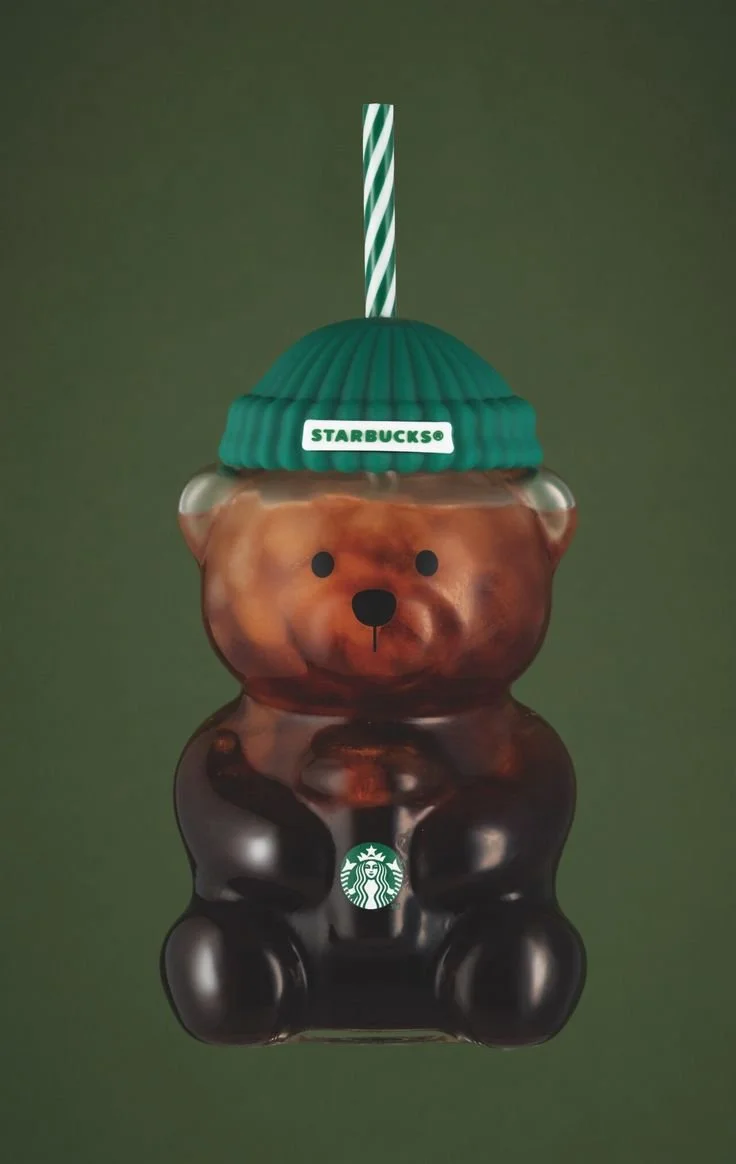We’re Fighting Over Cups While the Country Falls Apart
The Starbucks Bear Cup and the Collapse of Proportional Outrage
By Natalie McCarty
This week, Americans stood in pre-dawn lines outside Starbucks stores across the country to buy a thirty-dollar plastic cup shaped like a bear. Yes, you heard that right.
Videos on TikTok and X show people shoving, shouting, even threatening baristas. In some clips, customers cry or scream at employees who tell them the cups are sold out. One man calls corporate customer service from the drive-thru window. Another records a five-minute monologue about “betrayal.”
All of this over a cup.
The “Bearista” cold cup — a limited-edition release retailing for $29.95 — sold out almost instantly. In many stores, only a handful were available. Within hours, the product appeared online for resale, some listings topping $200. Starbucks issued a statement apologizing for the “unexpected” demand, which is a familiar corporate euphemism for deliberately engineered scarcity. In other words, bullshit is what it is.
Image Credit: Starbucks
But the real story isn’t the product. It’s the reaction: the fury, the entitlement, the misplaced grief. The bear cup debacle is the logical endpoint of a culture that’s lost any sense of proportion. As influencer Tana Mongeau pointed out on social media, “If you fought over the bear cup go donate that same amount of money NOW.”
We live in a country where 40 million people face food insecurity, where pandemic-era SNAP benefits have been slashed, where a government shutdown threatens essential programs, and where ICE raids continue to tear families apart in neighborhoods across the U.S. Yet the loudest expressions of moral outrage this week came not in response to state violence or economic cruelty, but to a limited-edition tumbler.
The contrast is grotesque, but also instructive.
This is what happens in a society where consumer identity has replaced civic identity. When public life collapses, private consumption fills the vacuum. When people feel politically powerless, they reach for products that promise control, comfort, or a sense of belonging. And it was the damn bizarre Starbucks bear cup that offered all three.
The frenzy isn’t random; it’s a symptom. The community yearns for capitalism.
Starbucks didn’t underestimate demand; rather, it exploited it. The company’s marketing strategy relies on the same logic that drives sneaker drops, celebrity fast-food collaborations, and luxury “it” items: create artificial scarcity, cultivate FOMO, and let consumers do the rest. The difference this time is that the spectacle exposed the emotional poverty that capitalism both causes and feeds on.
American outrage has become misdirected and displaced from the systems that harm us toward the service workers and corporations that symbolize them. The people screaming at Starbucks employees are casualties of an economic order that keeps them perpetually consuming. It should make us ask: why has rage become so privatized? Why do we save it for trivial shortages instead of systemic ones?
Part of the answer lies in how consumerism has colonized emotion. Over the last two decades, brands have learned to mimic the language of community and moral purpose. A coffee chain now markets “connection.” A tech company sells “freedom.” Every purchase becomes a statement of identity; every product, a substitute for meaning. Outrage itself is commodified and redirected toward micro-disappointments that can be soothed only through more consumption.
That cycle is self-sustaining. It depends on a population too distracted to notice that the same system that withholds affordable housing and healthcare is the one selling them $7 lattes and limited-edition merchandise.
Image Credit: Starbucks
The Starbucks bear cup frenzy might seem trivial compared to the structural crises facing the country, and it is. But it’s also a small, perfect metaphor for the spiritual condition of late capitalism: a nation that has lost its collective sense of urgency and is numbed by consumption. More, more, more. That’s what America runs on.
So yes, it’s “just a cup.” But this outrage points to something much larger: the socioeconomic and sociopolitical sickness that runs far deeper than caffeine culture.
Remember, friends: scarcity equals significance, not.


